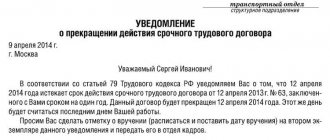Should the contract be terminated if pregnancy occurs?
When, shortly before the end of an employee’s employment contract, it becomes known that she is pregnant, there are two scenarios for the development of events:
- the employer is satisfied with her work and does not mind continuing to cooperate in the future. In this case, he can offer her maternity leave, and in addition to the contract, sign an agreement on the indefinite nature of the work;
- the employer does not want to continue to cooperate with the employee, but at the same time does not want to violate the Labor Code.
If everything is clear with the first option, then the second often confuses employers. After all, a pregnant employee working under a fixed-term contract has the same rights by law as any woman working in a company or enterprise.
This is reported in Chapter 41 of the Labor Code of the Russian Federation, from which it becomes clear that it is impossible to dismiss an employee just like that; she must also be provided with the required maternity leave. According to Article 261 of the Labor Code of the Russian Federation, the contract in such a situation must be extended.
Important! Of course, verbal notification of pregnancy is not enough. The employee must document this, that is, bring a certificate from the clinic. This is followed by writing a statement where she asks to be given leave in connection with pregnancy and the upcoming birth.
An application is written in free form, indicating the date of planned departure and a request to pay maternity benefits. It is important not to forget about the date and signature of the applicant. Sick leave and certificates from the clinic confirming pregnancy registration are attached to the application.
How to properly renew a document?
Repeatedly extending a fixed-term employment contract is far from the best idea , because it goes against the norms of the State Labor Code. But for some categories of workers, which also include women expecting a child, an extension is possible.
Previously, maternity leave for women on a fixed-term contract was given only until the end of pregnancy. Now they have every right not only to rest during the prenatal period, but also to rest after childbirth. According to Article 261 of the Labor Code and amendments to it dated June 29, 2020, No. 201-FZ, it is necessary to extend the employment relationship with a pregnant woman not only until the birth of the child, but also for the entire postpartum period.
In total, the rest period is 140 days , 70 days for each period. The duration of leave can be increased by childbirth with complications (86 days for the postpartum part), and the birth of more than one child (194 days in total).
Throughout the duration of the contract, the employer has the right to request a certificate from the pregnant woman confirming that she is still pregnant, but this should not be done too often (maximum once every three months).
Is it possible to fire a pregnant woman from work before maternity leave?
An employment contract is concluded with a worker under certain circumstances.
The most common reasons for structuring business relationships in this way are the following characteristics:
- seasonality of work;
- the need to replace a temporarily absent employee;
- short-term implementation of its activities by the company, etc.
A detailed list of reasons for concluding fixed-term employment relationships is presented in 59 articles of the Labor Code of the Russian Federation. It should be taken into account that the registration of fixed-term relationships under circumstances not specified in these regulations is a violation of labor legislation.
The maximum duration of the contract of the previously specified nature is 5 years. Upon its expiration, labor relations with employees are either terminated or formalized by concluding another agreement.
According to the Labor Code of the Russian Federation, an employer cannot fire a pregnant woman on his own initiative.
Termination of employment relations with this category of officially employed citizens is carried out in exceptional cases - when can a pregnant woman be fired?
It is important to note that the expiration of an employment contract is a reason beyond the control of the company’s management. The employer has no influence on the occurrence of this event. Despite this, it is impossible to fire an employee who is expecting the birth of a child. This is only possible in exceptional situations, under certain circumstances.
Article 261 of the Labor Code of the Russian Federation states that, upon expiration of a fixed-term agreement concluded with a girl in a situation, the agreement must be extended. The extension period is until the end of pregnancy.
If an employee takes maternity leave for pregnancy and childbirth, the contract is extended until its end.
To extend a fixed-term contract, certain conditions must be met. Among these, it is important to pay attention to the following:
- the girl must confirm pregnancy with an appropriate certificate obtained from a medical specialist;
- the girl must fill out an application requesting an extension of the contract.
The best option for renewal is the conclusion of an additional agreement. It is necessary to include all new working conditions.
Information regarding this document is reflected in Article 72 of the Labor Code of the Russian Federation. At the same time, the procedure for extending the employment relationship itself must also be accompanied by the issuance of a corresponding order from the employer.
We recommend reading:
- Dismissal of pregnant women due to job reduction.
- Dismissal of pregnant women during a probationary period.
Dismissal if the employment contract expires
One of the most common reasons for signing up female employees to a fixed-term employment contract is when the main employee goes on maternity leave. In such situations, the employer hires a new person temporarily.
If, while replacing a woman on maternity leave, the employee herself finds herself in a position, the employer, when the main employee returns to work, can fire the temporary one.
It is important to pay attention to one nuance.
The management of the enterprise cannot simply terminate the employment relationship with a pregnant woman. According to the Labor Code of the Russian Federation, in particular, analyzing the information in Article 261 of the Labor Code of the Russian Federation, we can conclude that the employer is obliged to offer a temporary pregnant employee a transfer to another vacant position. She can be fired only on the condition that the woman refuses the manager’s proposals.
The employee must be notified of the termination of a fixed-term employment contract.
Is there a maternity benefit?
A pregnant woman working under a fixed-term contract is subject to the same rules and rights as regular employees. When paying benefits, the form of the employment relationship does not matter.
In case of temporary loss of ability to work, a woman employed under a fixed-term employment agreement may qualify for maternity benefits. Its amount is determined depending on the employee’s average monthly earnings - calculate the BIR allowance using an online calculator.
To make calculations, specialists are guided by the information reflected in the sick leave certificate. The funds transferred to the employee’s account come from the territorial body of the Social Insurance Fund.
A woman expecting the birth of a child can go on maternity leave from the 30th week of pregnancy. If she is expecting the birth of 2 or more babies, she can go on maternity leave from the 28th week.
Maternity leave calculator.
Are maternity benefits paid for caring for a child over 1.5 years old?
It was previously stated that during the BiR leave, the girl is paid an appropriate allowance, which the employer cannot deprive her of. Leave of this nature in the standard case lasts 140 days - 70 days before and 70 days after childbirth.
What is the situation with the monthly benefit paid until the child reaches the age of 1.5 years?
To obtain a competent answer to this question, it is important to take into account that a fixed-term employment contract with a pregnant woman can be terminated immediately after the end of the labor and employment leave. The employer must do this on the same day. If there is no such opportunity, he is given a week to carry out this action.
Article 261 of the Labor Code of the Russian Federation states that it is impossible to dismiss women with children under 3 years of age at the initiative of the employer. The expiration date of an employment contract is a reason that is independent and does not depend on management.
The employer will not pay a dismissed employee a monthly child care allowance at the place of work.
To receive it, a woman needs to prepare a certain package of documents and contact the Social Security authorities, while social security pays child benefits in the minimum amount.
If a maternity leave contract ends while she is on maternity leave, the payment of monthly benefits is suspended. The company management independently transmits the necessary information to the government agency.
Registration of maternity benefits
Every pregnant employee has the full right to maternity leave, as well as to receive benefits in connection with pregnancy and childbirth. To do this, she needs to write a corresponding statement, indicating all her wishes. You can go on maternity leave as early as the thirtieth week of your term or when indicated in the application.
Payments to a pregnant employee on a fixed-term contract are made in the same manner as to all other employees. According to the law, a woman can count on maternity benefits (to calculate the amount of the benefit, you need to take the average earnings for the previous couple of years), a one-time benefit and a special benefit (it can be received after early registration).
In order to receive all the money due on time and without difficulties, you should submit all the necessary documents to the HR department on time: maternity leave issued by a doctor, a certificate of pregnancy registration, as well as an application for maternity leave and receipt of benefits.
Benefits can be paid both before and after childbirth. To receive payments before, you need to write an application and provide the maternity sick leave received at the antenatal clinic. The employer must make payments after childbirth no later than six months after the birth of the child.
How to conclude a fixed-term employment contract with a pregnant employee
If a company requires an employee to replace an absent employee, then a pregnant woman cannot apply for such a job. An employee may be absent due to maternity leave, a long business trip or sick leave.
First of all, when applying for a job, a woman must provide the following documents:
- passport;
- photograph for personal business;
- diploma, certificate or other document confirming the necessary education;
- work book (if there is no book, the employer must create one);
- SNILS;
- TIN;
- a certificate from the antenatal clinic confirming registration (required if a woman does not want to hide her pregnancy);
- a certificate from a medical institution confirming the absence of contraindications to work (for certain jobs).
When concluding a fixed-term employment contract, it must indicate the following information:
- full name of the employer;
- start and end date of work (sometimes a temporary employee replaces an absent permanent employee, in this case it is put o);
- position of the hired employee;
- job responsibilities;
- nature of work activity;
- work schedule (indicate what schedule the employee will work on: full/part-time, shortened week, flexible schedule, remotely);
- tariff rate;
- Compensation provided by the company
Termination of a fixed-term employment contract with a pregnant woman
The following cases are exceptions:
- The pregnant employee’s own desire;
- Termination of the activities of an individual entrepreneur or liquidation of a company.
Labor legislation does not prohibit enterprise managers from inviting pregnant women to sign fixed-term employment contracts. But in this case it is strictly prohibited to refuse an applicant on the basis that the woman is expecting a child, if she meets the employer’s requirements. If an employer does not hire a pregnant employee if she has sufficient experience and qualifications, he faces administrative liability and a large fine - up to 200,000 rubles.
At the same time, the employer must prove that it is not possible to hire a woman to the enterprise on a permanent basis, otherwise the refusal to conclude an open-ended employment contract will be regarded as an infringement of the rights of the applicant. Confirmation can be provided by a staffing table in which there would be no records of vacancies on the date of employment of the pregnant employee.
A pregnant woman can begin to register as a temporary worker after she provides the employer with the following documents:
- passport;
- photographs for establishing a personal business;
- diploma, certificate or other document indicating receipt of the necessary education;
- work book (if you don’t have one, the company’s HR department must create one);
- SNILS;
- TIN;
- a certificate from the antenatal clinic about registration (if the woman does not want to hide the fact of pregnancy);
- a certificate from a medical institution confirming the absence of contraindications to work (in certain cases).
A fixed-term employment contract must contain the following information:
- full name of the hiring company;
- the start and end date of the employment relationship (if a temporary employee must replace an absent permanent subordinate, the mark “until the conditions stipulated by this agreement occur” is put);
- the position for which the pregnant woman is hired;
- list of job responsibilities;
- nature of work activity;
- work schedule (full time, part time, shortened week, free/flexible schedule, remote work);
- tariff rate;
- compensation due to the type of activity.
When can an employee be fired?
There are nuances that allow, in some cases, to fire a pregnant employee on a fixed-term contract.
- Firstly, this can be done on the initiative of the employee herself. To do this, you must notify your employer in writing of your decision two weeks before your planned departure (or earlier by agreement of the parties).
At the same time, writing and submitting such an application does not exclude the possibility that a pregnant employee may change her mind and withdraw her application - this is absolutely legal. - Secondly, a fixed-term employment relationship can be terminated by agreement of the parties . If no one has anything against the contract not being renewed, you just need to draw up an agreement that confirms mutual agreement.
In addition, dismissal will not be illegal if the woman was initially hired temporarily to replace another employee , if the employee did not fulfill the necessary conditions for granting her maternity leave (that is, did not bring documents on time), and if the organization ceased to exist.
When an employment contract has been concluded to replace another employee, the employer is obliged, if possible, to offer the pregnant employee another position. The transfer is made with the written consent of the employee. If the transfer is impossible (there is no other job or the employee refuses), the contract will be terminated.Attention! It is not necessary to offer equivalent positions; according to the law, even less paid work is suitable, the only condition is that it meets the health requirements.
- If the employee does not submit an application for renewal of the contract and a certificate of pregnancy on time, the employer also has the right not to make concessions and not to extend the employment relationship (Part 2 of Article 261 of the Labor Code of the Russian Federation). Three days before dismissal, he must give written notice of dismissal.
- According to the first part of Art. 261 of the Labor Code of the Russian Federation, if an enterprise is liquidated or an individual entrepreneur ceases its activities, there is no other choice but to terminate contracts with all employees, including those who are preparing to become mothers. In this case, the employer is obliged to notify about this in advance - two months in advance; during this period the contract must be terminated and all compensation paid.
- The contract must also be terminated if the employee continues to work after the end of pregnancy (this is stated in Law No. 201 of June 29, 2015). Dismissal must occur within a week from the day it became known.
Let's sum it up
- A fixed-term contract with a pregnant employee is extended until the end of the pregnancy, and if maternity leave is granted, after its end.
- If a pregnant woman is hired during the absence of the main employee, the contract with her is terminated after the main employee returns to work.
- You can also dismiss a pregnant employee at her request or by agreement of the parties.
- If an employee continues to work after giving birth, she can be fired within 1 week from the date the pregnancy ends.
If you find an error, please select a piece of text and press Ctrl+Enter.
Is maternity leave possible?
As we discussed earlier, any woman has the right to receive maternity leave at her job. Workers on fixed-term contracts are no exception. What happens when the vacation ends? Can they, like other company employees, count on maternity leave? Many people mistakenly believe that they can. However, this is absolutely not true.
If the employer likes the way the employee copes with her responsibilities, and he would not like to lose valuable personnel, after the end of her leave, he has the right to continue the employment relationship with her and provide her with leave while caring for the child.
However, according to the law, no one can force anyone to do this, since the woman does not work under standard conditions. Therefore, no matter how much the employee would like to stay, she can be fired immediately after the required maternity leave ends.
Features of the dismissal procedure
As discussed in the previous section, the maximum duration of a fixed-term employment contract is five years. Afterwards, in accordance with Article 79 of the Labor Code of the Russian Federation, the employment relationship must end, unless both parties to the transaction want to continue cooperation.
Features of dismissal under a fixed-term employment contract are as follows:
- Having decided to dismiss an employee after the expiration of a fixed-term contract, the employer is obliged to notify him of this at least three days in advance, giving him the appropriate written document, which must indicate the following information: the employee’s details (last name, first name, patronymic), his full name position, reasons for dismissal with reference to the relevant article of the Labor Code of the Russian Federation, document data, date of preparation and personal signature;
If the employer does not notify the employee within three days, the fixed-term contract automatically becomes unlimited (based on Article 58 of the Labor Code of the Russian Federation).
- If the reason for dismissal under an open-ended employment contract is the return of an absent employee, then the employer is not required to report the dismissal three days in advance;
Read about how an order to perform the duties of a temporarily absent employee is drawn up here.
- After the employee has read the notice and agrees with management's decision, a dismissal order will be drawn up and issued, which will indicate the reason for dismissal, as well as a reference to three days' advance notice;
- Afterwards, all the necessary documentation will be collected, the results will be summed up, and an entry will be made in the work book (about the length of service and the reason for leaving the enterprise);
- the final calculation of wages , due compensation and due payments (for example, for unused vacation days must be ;
Upon dismissal at the end of the employment contract, payment of severance pay is not provided.
- On the last working day, the dismissed employee receives all the necessary documents (employment contract, work book) and salary calculation;
The most important changes this spring!
A fixed-term employment contract is one of the legal forms of labor activity, in which, already at the time of employment, the parties reliably know the date of its termination. Concluding an employment agreement of a temporary nature is possible in certain cases when any factors prevent an employee from registering for work on a permanent basis. In this case, the employer is obliged to reflect them in the document itself.
It is permissible to dismiss a woman due to the expiration of an employment contract during her pregnancy, if the employment contract was concluded for the duration of the duties of an absent employee and it is impossible, with the written consent of the woman, to transfer her to another job available to the employer before the end of her pregnancy (as a vacant position or a job corresponding to the woman’s qualifications, and a vacant lower-level position or lower-paid job), which a woman can perform taking into account her state of health. In this case, the employer is obliged to offer her all the vacancies that he has in the given area that meet the specified requirements. The employer is obliged to offer vacancies in other localities if this is provided for by the collective agreement, agreements, or employment contract. However, if the pregnancy is suddenly terminated, there is no need to postpone the dismissal date. Therefore, the Labor Code provides the employer with the opportunity to control this process. Namely, no more than once every 3 months to request a certificate from the antenatal clinic. In this way, the interests of companies are protected from unscrupulous workers.
Prohibition on dismissal of a pregnant employee
It is a myth that it is impossible to fire an employee during pregnancy. Current laws do not allow the dismissal of pregnant employees only at the initiative of the organization (with the exception of situations when a company or individual entrepreneur is liquidated - Part 1 of Article 261 of the Labor Code of the Russian Federation).
Dismissal due to the expiration of a temporary contract is not classified by the Labor Code of the Russian Federation as one of the cases of dismissal at the initiative of the employer. Therefore, a pregnant woman who has signed a fixed-term employment contract can be fired on this basis.
The essence of a fixed-term contract
All employment contracts are divided into two categories: open-ended and fixed-term. The last type of agreement between an employee and an employer is concluded for a period not exceeding 5 years. The conclusion of fixed-term contracts is regulated by Article No. 58 of the Labor Code of the Russian Federation. This article states that drawing up an agreement for a certain period is possible only when the labor process in the organization does not allow concluding a fixed-term contract (for example, for seasonal work). It is noteworthy that the subordinate’s work book does not indicate the type of contract he signed.
Working under the terms of a fixed-term contract, an employee has several other rights:
- There is no need to undergo a probationary period.
- Based on a contract that is valid for no more than two months, the employee is given the opportunity to work on weekends for additional pay.
- The employee is not paid severance pay.
- Notice of dismissal must be given at least three days before leaving.
When is dismissal possible?
Replacing an employee
Dismissal of a subordinate becomes possible if she temporarily replaced another employee of the company. The employee who was replaced may appear at his workplace at any time. A pregnant woman can lose her job at any time. Then the boss must transfer the employee to another position, and qualifications and wages do not matter. If there are no available jobs in the organization, or the employee voluntarily refuses to work in a new place, then the question of whether the contract can be terminated is removed, and the dismissal is considered legitimate.
Liquidation of a company
Liquidation of an individual entrepreneur means the termination of the existence of a legal entity. In practice, such situations rarely occur. This group also includes staff reduction or company restructuring.
Important! According to Article No. 178 of the Labor Code, in the event of liquidation of an individual entrepreneur, a woman still has the right to receive maternity benefits for two months.
Voluntary initiative of a female worker
An employee can terminate her employment contract with the company at her own request. Quite often, business loses its social face, and pregnant women are subject to “pressure” from employers. A huge amount of work, increased control, new obligations - all these are manifestations of pressure from the management apparatus. Problematic situations are resolved by filing a lawsuit and writing a statement to the prosecutor's office.
Is it possible to terminate a fixed-term employment contract with a pregnant woman?
Labor legislation protects the interests of pregnant women, and therefore they cannot be fired even if a fixed-term employment agreement is concluded. The only possible options are:
- initiative of the pregnant woman herself;
- termination of the activities of an individual entrepreneur or liquidation of the employing organization.
In other cases, the employer is obliged to keep the pregnant employee’s job, that is, to extend the fixed-term employment contract. Previously, the agreement was extended until the birth of the child (or until termination of pregnancy - abortion, miscarriage), but today the employee must remain employed during maternity leave. In this case, it does not matter whether the pregnant woman works as a part-time employee or as a main employee.
How to extend a fixed-term employment contract with a pregnant woman
Typically, an employment agreement with a pregnant woman is extended indefinitely. A note is made that the agreement is valid for the duration of the decree or until the occurrence of the specified event. If it is fundamentally important for an employer to specify the exact day of a woman’s dismissal, he is guided by the following deadlines:
- in general, labor and employment leave lasts 140 calendar days (70 days before the birth of the baby and 70 days after the birth);
- maternity leave is extended to 196 days if an ultrasound scan shows a multiple pregnancy;
- for women who gave birth to a child early (at 26-30 obstetric weeks) of pregnancy, or who had complications during the period of bearing the baby, leave under the B&R lasts 156 days (the same applies to women in labor who underwent a Caesarean section);
- if the employee is registered in an area hazardous due to radiation waste, the vacation lasts 160 calendar days.
The procedure for extending a fixed-term employment contract with a pregnant employee is as follows:
- A woman writes an application addressed to her employer with a request to extend a fixed-term contract, attaching a certificate of pregnancy to the document.
- The employer schedules a medical examination (at his own expense) to ensure pregnancy. If this is not necessary, the manager has the right to demand a certificate from a gynecologist every 3 months (no more often).
- The employer issues an order indicating the reasons for extending the contract. The employee signs it.
End of a fixed-term employment contract during pregnancy
If a woman was not hired to replace another employee, then provided she provides a medical certificate of pregnancy and an application to extend the employment agreement, her dismissal will be illegal, even if the contract has expired. The employer will be able to return to this issue only after the birth of the baby or the end of pregnancy for other reasons.
In order to continue working, you must submit an application addressed to the head of the enterprise with a request to extend the employment agreement and attach a medical certificate of pregnancy to it. If such actions are not taken, then the employer may well try to terminate the employment contract. But if the employee appeals to the judicial authorities, most likely the court will side with her.
We suggest you familiarize yourself with Which court issues a court ruling
The employer retains the right to control the situation by requiring the woman to provide a certificate every 3 months. If he does not do this or requests the document more often, then the woman is not obliged to satisfy his requests and bring the certificate again on her own initiative.









